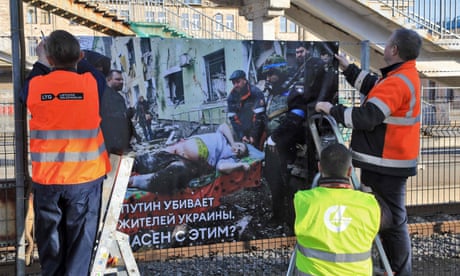- by foxnews
- 23 May 2025
‘Putin is killing civilians’: the train station where Russians are greeted with images of war
‘Putin is killing civilians’: the train station where Russians are greeted with images of war
- by theguardian
- 10 Apr 2022
- in news

As the night train from Moscow pulled into Vilnius central station for its scheduled 10-minute stop, a curious pair of eyes peeked through one of its windows - only to disappear behind a hastily closed curtain.
The passengers on the train were heading to the Russian exclave of Kaliningrad, which can be accessed via rail only by crossing through Lithuania, and on the platform outside they were faced with images of war and destruction.
Twenty-four large photographs, graphically depicting bombed-out Ukrainian cities, dead Ukrainian children and bloodied Ukrainian bodies with shrapnel wounds, have been installed here by Lithuania's rail provider LTG, which also provides the locomotive that pulls the Russian carriages through EU territory.
They all carry the same message in Russian, which is repeated through the public address system as the train stops: "Today, Putin is killing civilians in Ukraine. Do you support this?"
"People in Russia don't have much access to unbiased information," said Mantas Dubauskas, an LTG spokesperson. "Maybe we can change the minds of just a couple of passengers."
The installation at Vilnius central station is symbolic of a Baltic nation that doesn't so much look cowed by the war in a fellow former Soviet state, as emboldened to tell the world it needs finally to stand up to Russia.
In the first few days after Russian troops stepped on to Ukrainian soil on 24 February, anxiety spread around Lithuania, which has been an independent republic since 1990 and a member of Nato since 2004.
"It brought up a lot of historic fears in my country," said Linas Kojala, director of the Eastern Europe Studies Centre thinktank. "I had dozens of messages from friends asking what would happen next. Some asked if they should leave the country, maybe to Spain or Portugal. You just have to look at a map of the region to feel uncomfortable."
The southernmost of the three Baltic EU countries, Lithuania borders Kaliningrad to its west and Belarus to its east - a military corridor between the exclave and the client state would cut the Baltic states off from the rest of Europe.
But within days of the start of Russia's invasion, anxiety in the Baltics had transformed into resolve. In the centre of Vilnius, Ukrainian flags outnumber Lithuanian ones, with the yellow and blue draped around government buildings, sprayed on old city walls or wrapped as scarves around shopfront mannequins.
It was also one of the first EU countries to downgrade its diplomatic ties with the Kremlin after reports of war crimes emerged from Bucha, withdrawing its own top diplomat from Moscow and asking the Russian ambassador to leave the Lithuanian capital.
"We wanted to remind people how important it is to keep looking at what Russian aggression is doing," said Berta Tilmantaite, a journalist and artist who helped organise the protest. "I can understand why people look away or get tired of the news.
"But in Lithuania we know Russia, and we don't feel scared at this moment," Tilmantaite told the Observer. "We feel a lot of determination."
Tensions between Moscow and Vilnius had been rising after the Soviet foreign minister accused Lithuania of torturing and killing three of its soldiers. With Russian troops massed on its borders already outnumbering its own, the Lithuanian government handed over the country to a puppet regime. Most of the exhibition space at the museum is given to those partisans who continued to fight for independence nonetheless.
Migle Kriksciunaite, 25, was visiting the museum into the afternoon sun with her parents. Were there lessons that the rest of Europe could learn from Lithuania's history? "The lesson our history teaches us is quite simple," she said. "Fight for your freedom. It's that straightforward."
- by foxnews
- descember 09, 2016
United Airlines flight returns to Hawaii after concerning message found on bathroom mirror; FBI investigating
United Airlines Flight 1169 to Los Angeles returned to Hawaii after a "potential security concern" aboard the plane. The FBI and police are investigating.
read more


